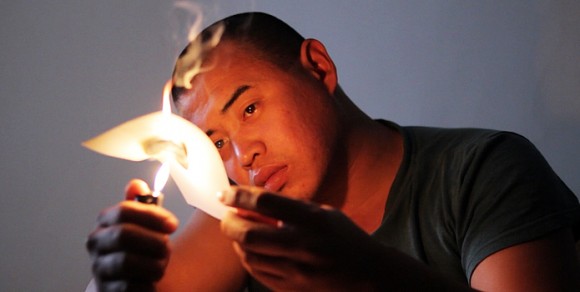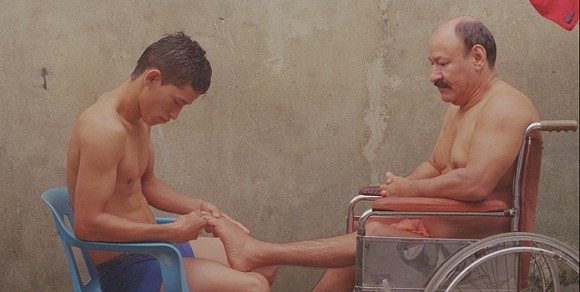TIFF Day 4: Elles / Hanaan / The Last Gladiators / Porfirio / Wuthering Heights
Elles (Malgoska Szumowska, France/Poland/Germany)—Special Presentations
 By Sergio Baldini
By Sergio Baldini
In Elles, a female journalist from the woman’s magazine Elle (played by Juliette Binoche, whose presence reinforces the sub-Hanekean tenor of the film) is investigating student prostitution. She interviews two young women, one French, one Polish, living in Paris, who have turned to hooking to finance their education. Listening to their accounts of paid sexual encounters, the journalist is disturbed by their sometimes shocking nature, and by the two girls’ uninhibited sexuality. This in turn makes her aware of her humdrum bourgeois life with a husband and child, which has extinguished her sex life, both real and fantasized. Such a synopsis sounds trite and full of clichés—and indeed it faithfully reflects the nature of Malgoska Szumowska’s film, which has all the insight of an article in a woman’s magazine. (Say, for example, Elle). The mise en scène matches the project’s stupidity and dullness, and culminates in an uninspired ending: a business dinner organized by the journalist’s husband, haunted by phantoms of her interviewees’ clients (Szumowska rashly referencing Buñuel here). Rather than suffer this pretentious failure, you’d be better off seeing Emmanuelle Bercot’s excellent Mes chères études, a film on the same subject made for television in 2010.
Hanaan (Ruslan Pak, South Korea)—Discovery
 By Mark Peranson
By Mark Peranson
It’s no hot shakes being a Korean in Uzbekistan. Deported to the Far East of the USSR under Stalin, the fourth-generation Koreans living in Tashkent have integrated into society but remain subject to daily racism, and, if we take Hanaan as a factual representation, are knee-deep in drug-related violence. Six years after a friend was killed, the older and wiser Stas (Stanislav Tyan) has become a policeman, working undercover to infiltrate a gang of Uzbek heroin dealers. But the corruption he discovers pushes him to the limits, and into a downward spiral emblematic of the destiny of the Korean outsider in the post-Soviet society.
In his stark debut, which plays as a Korean-Uzbek version of Serpico (with a nod to French Connection II), director/writer Ruslan Pak—who also acts as Shin, Stas’ friend who escapes to Korea (possibly the hanaan, or promised land, of the title)—shot down and dirty in the streets, alleyways and apartments of his hometown, using a DSLR camera and without the permission of local authorities, as with the subject matter and graphic scenes of drug use, governmental approval of the script was undoubtedly impossible. It’s all rather clunkily staged and performed and not exactly original, but that’s forgiveable to some extent, as Hanaan is based on the life of Stanislav Tyan, who in his first-ever performance reenacts many of the excruciating events he lived through himself—scenes surely tough to film, and just as tough to watch.
The Last Gladiators (Alex Gibney, US)—Real to Reel
 By Adam Nayman
By Adam Nayman
Porfirio (Alejandro Landes, Colombia/Spain/Uruguay/Argentina/France)—Visions
 By Michael Sicinski
By Michael Sicinski
Should we read up on films before seeing them, or try to go in without preconceptions? This question is directly applicable to Landes’ film but could well be generalized as a broader one regarding appropriate spectatorship. An accomplished and engaging film in every way, Porfirio nevertheless induces a degree of déjà vu from a strictly cinematic standpoint. A sunbaked observational piece about a paraplegic (Porfirio Ramirez Aldana) living a modest life with his layabout son (Lissin Ramirez) and girlfriend (Jasbleidy Santos Torre) selling phone minutes to area residents, Porfirio minutely chronicles his daily struggles: maneuvering in and out of his wheelchair, getting open-air baths, grabbing hard-to-reach objects. He’s also struggling to get a hearing from the Colombian government, since he is clearly owed a settlement and getting the bureaucratic runaround. (An innocent bystander caught in the drug-war crossfire, Porfirio was accidentally shot in the spine by a policeman during a shootout.) But Landes also shows us more graphic scenarios. We see Porfirio taking a shit, having graphic sex, and being shirtless and sweaty pretty much all the time, like a cross between Cheech Marin and a Butterball turkey, all in hard, unforgiving medium shots. Suffice to say, there is a spectre haunting Porfirio, and it’s Carlos Reygadas. Having said this, a final-buzzer revelation arrives which undoubtedly recodes all that comes before it, and, if known ahead of time, would produce a radically different viewing experience. [SPOILERS AHOY.] Porfirio is a true story, re-enacted by the actual participants. In fact, Ramirez’s attempted skyjacking has made him a modern Colombian folk hero, a people’s outlaw in a nation overrun by, well, outlaws with causes far less just. Landes (Cocalero) does not obviate all stylistic concerns with this quasi-docudrama approach, but he certainly complicates matters, and compellingly so.



